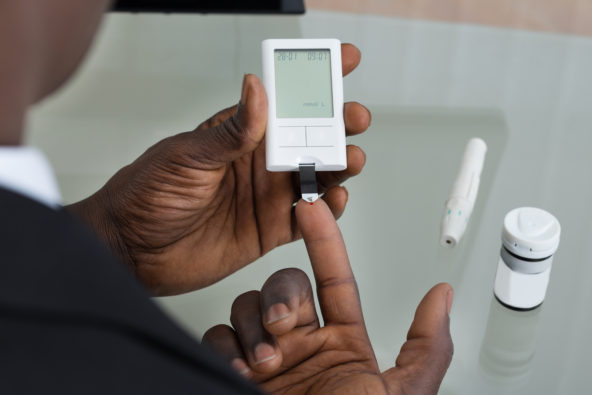Diabetes is at epidemic proportions in this country, particularly among black folks. We are twice as likely to develop the disease and to die from it as white Americans. Unfortunately, far too many of us have the disease and don’t know it, leaving unchecked blood sugar levels to wreak havoc on our bodies.
Symptoms can be subtle at first. But left untreated, high blood sugar can have a serious impact on health. Some signs your blood sugar has run wild include:
You keep going to the bathroom. When there’s too much sugar circulating in your blood, your body gets rid of it through urine. So you’ll pee a lot, particularly at night.
You’re tired a lot. When your cells aren’t getting glucose, they are being starved of energy, which can make you feel like you’re always tired. Elevated sugar levels also makes your blood thicker, and your heart has to work harder to pump it.
Your sex drive decreases. Difficulty getting an erection or having an orgasm can signal out-of-control blood sugar levels. Excess sugar in the blood damages the nerves and blood vessels critical to making sex possible. Men may experience erectile dysfunction due to blood vessel damage, and some might have retrograde ejaculation, where semen travels to the bladder instead of through the tip of the penis. Women may have reduced genital sensation, vaginal dryness or painful sex.
Your fingers and toes hurt. Peripheral neuropathy, or numbness in your fingers and toes, can be a sign your blood sugar has been too high for a long time. The ends of the longest nerve fibers in the body are affected first, which is why feet, legs, arms and hands are vulnerable. Nerve damage to your extremities can produce a range of symptoms, from a burning sensation to prickling to sharp pain. Getting blood sugar levels under control can prevent further damage, but if your sugars have been high for years, the problem probably won’t go away.
Your heart is affected. If you have diabetes, your risk of heart attack and stroke are significantly elevated. But here’s good news: In a major clinical trial, maintaining tight glucose control reduced the risk of heart disease and death in people with diabetes.
Your kidneys stop functioning properly. Your kidneys have a network of tiny blood vessels that filter waste products from the blood. When blood sugars are elevated over a long time, the filtration system works overtime to clear excess sugar from the blood. This causes the filters to become scarred and unable to function properly. Eventually, your kidneys can stop working, and you’ll need dialysis or a transplant. The first sign of trouble? Increased protein levels in your urine.
Your smile loses its sparkle. Uncontrolled blood sugar can do a lot of damage inside your mouth. Sugar in your saliva feeds bacteria in your mouth, leaving plaque on your teeth, which can cause bad breath and lead to tooth decay, bleeding gums and dry mouth.






